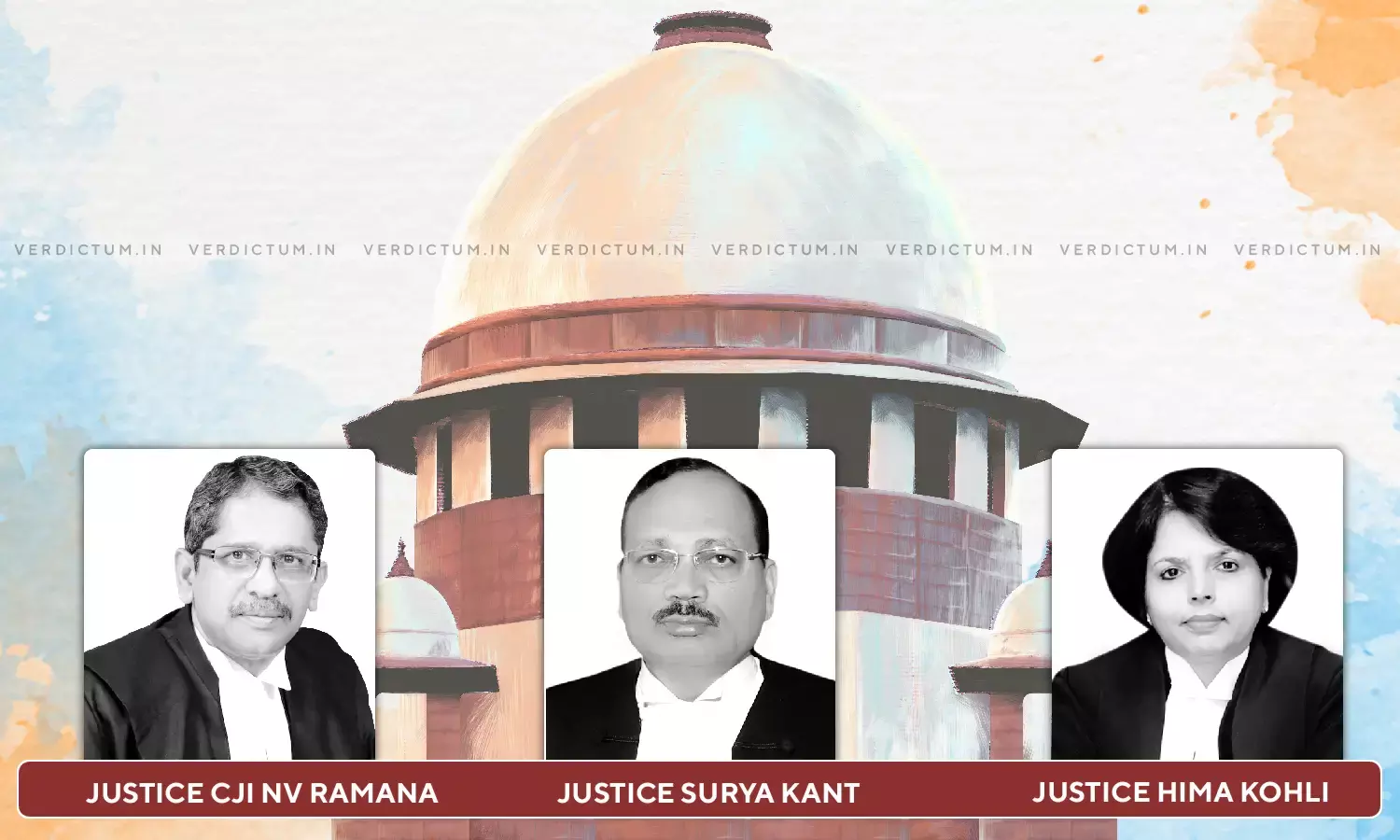Courts Have Limited Jurisdiction To Adjudicate Whether Stamp Duty Paid Is Insufficient Or Appropriate U/s. 11(6) of Arbitration Act - SC Reiterates
A three-judge bench of the Supreme Court comprising of Chief Justice NV Ramana, Justice Surya Kant, and Justice Hima Kohli, while relying upon Vidya Drolia v. Durga Trading Corporation, (2021) 2 SCC 1, has held that Courts have limited jurisdiction under Section 11(6) of the Arbitration and Conciliation Act, 1996 and a narrow exception carved out was that Courts could adjudicate to "cut the deadwood".
The Court noted that the present case was not a case of complete nonstamping and hence, it proceeded to refer the matter to arbitration.
Mr. Ritin Rai, Senior Advocate appeared on behalf of the Petitioners while Mr. Navkesh Batra appeared on behalf of the Respondents.
The Court was dealing with a petition filed under Section 11(6) read with 11(12)(a) of the Arbitration and Conciliation Act, 1996.
The Petitioners before the Court were the subsidiaries of Intercontinental Hotels Group PLC (IHG). The Respondent is an Indian company in the hospitality sector that entered into a Hotel Management Agreement with the Petitioner for renovating the existing infrastructure in accordance with the brand standards established by IHG.
The Respondent was bound to pay an incentive management fee to Petitioner no. 1 at the end of each month for the renovation to be undertaken by the Petitioners. Petitioner no. 2 was to be paid a license fee for use of brand and marks.
The issue concerned alleged failure on part of the Respondent to pay the requisite fee. The Respondent sent an email terminating the agreement. The Petitioners contended that unilateral termination of the agreement was not valid legally.
The Petitioners sought interim relief via a Section 9 action. The High Court passed an interim order directing the Respondent not to evict the Petitioners from the premises without due process of law until further orders.
Settlement talks failed and the Petitioners invoked Clause 18.2 of the agreement which concerned dispute resolution. The notice of arbitration was issued. The Respondent allegedly filed a reply stating that the notice was not a notice and did not warrant a reply.
Petitioners communicated their intention to invoke arbitration to SIAC. Respondent sent a reply to the notice issued by SIAC stating that notice of arbitration of the Petitioners was defective and not curable. Given that Respondents had denied appointing a suitable arbitrator, instant action was instituted.
A preliminary defence was taken by the Respondent stating that the agreement was an unstamped document and reliance was placed on Garware Wall Ropes Ltd. v Coastal Marine Constructions and Engineering Ltd., (2019) 9 SCC 209. An application to cure the same was filed by the petitioners.
The Court noted that "The initial interpretation provided by this Court to examine issues extensively [at pre appointment stage], was recognized as being against the pro-arbitration stance envisaged by the 1996 Act."
The Court relied upon Vidya Drolia v. Durga Trading Corporation, (2021) 2 SCC 1, which clearly expounds that Courts had very limited jurisdiction under Section 11(6) of the Act.
The Court noted that in N.N. Global Mercantile Private Limited v. Indo Unique Flame Limited, (2021) 4 SCC 379, the proposition laid down in Garware walls Ropes Case was doubted and it was held that the utility of the doctrine of separability overrides the concern under respective Stamp Acts. However, the issue was referred in light of Vidya Drolia.
The Court noted that while there was a need to constitute a larger bench, it was cognizant of time sensitivity in arbitration matters. The Court noted that "All these matters are still at a preappointment stage, and we cannot leave them hanging until the larger Bench settles the issue. In view of the same, this Court – until the larger Bench decides on the interplay between Sections 11(6) and 16 – should ensure that arbitrations are carried on unless the issue before the Court patently indicates existence of deadwood."
The Court then dealt with the issue as to whether the issue of insufficient stamping raised by the Respondent is deadwood and clearly indicative of an unworkable arbitration agreement.
After interpreting provisions of the agreement, Court made the following observations:
"Having perused Clause 22.1, it is necessary to note that the respondent is under an obligation to ensure that the agreement would be legally valid in India. If such an obligation was undertaken by the respondent, the extent to which the petitioners can rely on the respondent's warranty, is clearly a debatable issue. Further, it is also a matter of adjudication whether the respondent could have raised the issue of validity of the arbitration agreement/substantive contract in view of the warranty. This aspect clearly mandates that the aforesaid issue is not deadwood."
The Court noted that as per Vidya Drolia Case, the issue of the existence of the arbitration clause need not be looked at as payment of stamp duty had taken place. The Court noted that in order to ascertain whether adequate stamp duty has been paid, the Court would have to examine the nature of the substantive agreement.
The Court noted that ".. it is clear, that stamp duty has been paid, whether it be insufficient or appropriate is a question that maybe answered at a later stage as this court cannot review or go into this aspect under Section 11(6)"
The Court, therefore, referred the matter to arbitration and appointed Justice AV Chandrashekara, Former Judge, High Court of Karnataka as the sole arbitrator in the matter. The parties were directed to take steps to convey the order to the SIAC to proceed in terms of the SIAC Rules.
Click here to read/download the Judgment




